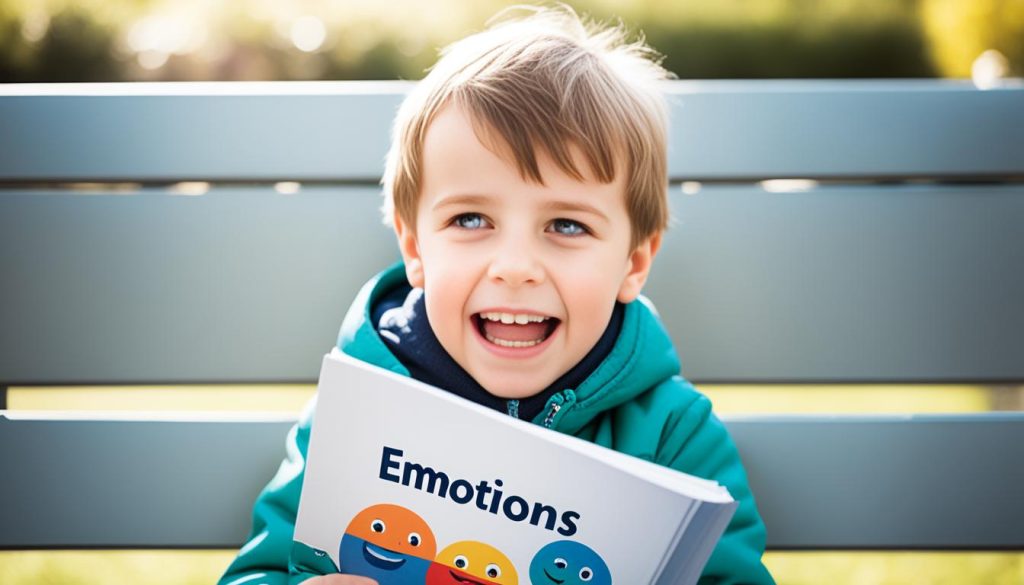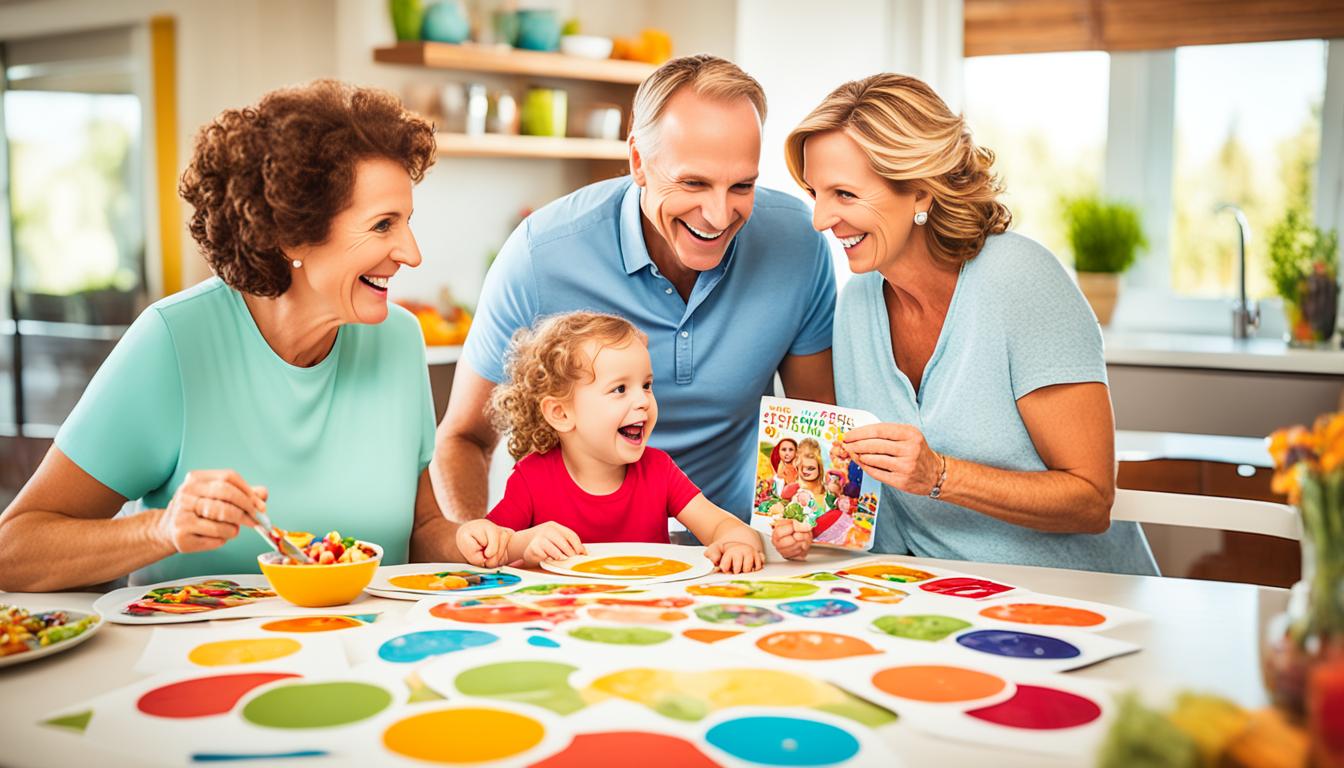Imagine sitting at the kitchen table, watching your child struggle with homework. You might want to help them, but the real lesson is in the process. Parenting can feel tough, especially when you’re trying to help your child’s mental health while letting them be independent.
In the early days of parenting, you might try to be perfect, thinking every choice will affect your child’s future. You might face sleepless nights and endless advice. But, I learned a key truth: it’s not about being perfect. It’s about understanding and supporting your child’s growth.
Spending time with your kids, like during family dinners or bedtime stories, can deeply affect their behavior and feelings. Being a good role model is crucial, as kids watch and learn from us. Through positive, consistent interactions, we help them grow and stay emotionally healthy.
Key Takeaways
- Negative interactions are often more frequent than positive ones; aim to reverse this trend.
- Encouragement and praise lead to better behavior in children than constant scolding.
- Consistency in discipline helps children develop self-control and proper behavior.
- Quality time during meals or special nights greatly impacts children’s behavior and emotions.
- Children mimic their parents, so being a good role model is crucial.
- Flexible parenting styles that adapt to children’s growth are more effective.
- Unconditional love fosters a healthy relationship, even during disciplinary moments.
Parenting is a journey of growth, not perfection. Use effective strategies, and your home will become a happier place for your children.
Understanding Positive Parenting
Positive parenting means always caring for and teaching your child. It’s about leading, communicating, and meeting their needs without conditions. By using positive parenting techniques, parents help their kids grow emotionally and socially. This creates a happy, strong family.
Benefits of Positive Parenting
Positive parenting helps reduce the bad effects of tough family situations like poverty and stress. It also helps kids do better in school and behave better. It’s key to set clear rules while showing love and patience.
Positive actions with kids, like emotion coaching, make them behave better and feel good. This method has shown to greatly improve kids’ behavior. Teaching kids to be responsible and treating them with respect and empathy helps them learn important life skills.

Practical Examples of Positive Parenting
In everyday life, positive parenting means using certain strategies. Dr. Bates says it’s important to meet your child’s real needs, not just follow strict parenting rules. Letting kids take the lead in play helps them feel more confident and strengthens the bond with parents.
Dr. Crnic suggests that kids should face tough situations to learn how to cope. Teaching them how to deal with feelings and follow rules helps them manage their emotions. Supporting them through hard times builds emotional strength, helping them handle life better as they get older.
| Strategy | Benefit |
|---|---|
| Emotion Coaching | 79% improvement in positive behaviors |
| Allowing Child-Led Play | Boosts confidence and parent-child relationship |
| Teaching Coping Skills | Helps in emotion regulation and rule-following |
| Clear Limitation Setting | Encourages balanced and loving discipline |
Developing Emotional Intelligence in Children
Teaching emotional intelligence in children is crucial for their success and happiness. Emotional smarts are more important than IQ for future success. Skills like self-control are better signs of success than IQ or family background.

Teaching Kids to Identify Emotions
Helping kids recognize and name their feelings is a key part of social-emotional learning. Tools like Feelings Wheels work well for this. By age four, kids start to handle feelings better, but by age 10, they use more advanced ways to control their emotions.
Parents who understand their feelings and connect with their kids’s emotions help their kids do better in life. Even though it’s hard to always be an emotion coach, it’s okay. Most parents try their best, and that’s what matters.
Strategies to Manage Emotions
It’s not just about knowing feelings; it’s also about handling them well. Teaching kids mindfulness and letting them express themselves helps them manage their feelings better. Ignoring tantrums is a smart move that teaches kids patience and how to handle emotions.
From a young age, teaching kids to manage their feelings sets them up for a better future. A safe and caring home helps kids grow and learn more. Teaching kids to respect their feelings leads to good mental health, strong relationships, and happy work lives.
Handling child tantrums well helps kids learn emotional intelligence. Parents are key in teaching these skills. This way, kids grow into caring and strong adults.
Setting Boundaries with Kids
Setting clear boundaries with your kids is key for their emotional health and feeling safe. It helps them understand the world better. You can do this with smart strategies and knowing why boundaries are important at home.

Importance of Boundaries in Family
Boundaries help kids grow confident, responsible, and empathetic. It’s vital to set the right limits for kids of all ages. Setting rules for things like meal and bedtime times helps them cooperate better and behave well.
It also helps them make healthy choices. By teaching them to respect their own and others’ boundaries, you guide them well.
Family boundaries are more than just rules. They include habits, routines, and special family traditions. Rewarding kids when they follow these rules encourages them to make good choices. This way, you can set clear and fair boundaries.
Effective Techniques for Boundary Setting
Setting boundaries means being clear, confident, comfortable, and connected with your child. Talk about what’s expected and be consistent with rules. Making some tasks more fun can help kids follow the rules better.
Thinking about success and getting ready for challenges helps too. Balancing work and family life is key to setting good boundaries. Taking care of yourself helps you set clearer boundaries.
It’s important to not feel guilty or try to please everyone all the time. The goal is to create a safe and loving home for your kids.
Teaching kids to be grateful for boundaries helps them see their value. As they get older, you’ll need to adjust these boundaries. But always keep the goal of raising respectful and strong kids in mind.
Building Self-Esteem in Children
Helping children feel confident and have a strong sense of self is key for their growth and well-being. It’s crucial for them to develop high self-esteem to face life’s challenges well.
Encouraging Positive Self-Image
Encouraging creativity in children helps build a positive self-image. It lets them express themselves and explore their interests. This helps them find their identity. Studies show that focusing on strengths can make a child 60% more likely to have a positive view of themselves.
Creativity also helps with mental health by giving kids a way to deal with feelings and thoughts.

Positive reinforcement parenting is also great for a child’s self-image. The American Psychological Association found that praising effort boosts motivation and persistence in 85% of children. This method teaches kids that it’s okay to make mistakes, which is important for avoiding high, unrealistic standards.
Acknowledging Achievements and Efforts
It’s important to praise both what children do and what they achieve. Celebrating small wins and big milestones can really help their confidence. Using Positive Tracking Charts is a good way to reward good behavior.
It’s key to balance challenges with chances for success. Trying and learning from mistakes is part of growing up. Showing unconditional love and appreciation helps build a child’s self-worth and supports their mental health.
Here are some important facts to highlight the value of these ideas:
| Key Insight | Impact on Children |
|---|---|
| High self-esteem reduces risky behaviors | Children with high self-esteem are 70% less likely to engage in smoking, drinking, or drug use. |
| Effort-based praise boosts self-worth | 85% of children praised for their efforts show increased motivation and persistence. |
| Criticism impacts mental health | Children exposed to more criticism than positive reinforcement are 3 times more likely to develop depression or anxiety. |
| Focus on strengths | Children focusing on strengths have a 60% higher chance of positive self-image. |
Managing Screen Time
Parenting today is tougher than it was 20 years ago, thanks to technology. 66% of parents in the U.S. say it’s harder now. Screens are everywhere in kids’ lives, making it hard for parents to manage screen time.
Setting Reasonable Limits
It’s key to set limits on screen time for kids’ health. 71% of parents worry their kids spend too much time on screens. The American Academy of Pediatrics suggests kids under 5 should watch screens for only one hour a day. For older kids, setting clear rules, like no screens before bed, helps them sleep better.
Here are ways to set limits:
- Establish Screen Time Rules: Make rules about when and where screens can be used. This could mean no screens during meals or family time.
- Enforce Curfews: Set nightly device curfews to ensure screens are off an hour before bed.
- Monitor Usage: Keep track of how much time your child spends on devices to help them stay within limits.
Alternatives to Screen Time
Offering screen-free alternatives is key to managing screen time. Encourage hobbies and activities without screens to boost your child’s well-being. Here are some great alternatives:
- Outdoor Activities: Get your child moving with activities like biking, hiking, or sports.
- Creative Hobbies: Try drawing, painting, or building with LEGOs to spark creativity.
- Reading and Storytelling: Reading improves literacy and is a great way to relax.
- Family Projects: Work on cooking, gardening, or projects together to build family bonds.
Creating tech-free zones or times, like during meals or a screen-free night, helps with healthier screen habits. Watching how your kids use online and social media is also crucial. Setting a good example with your screen use is key, as kids often follow what parents do.
In conclusion, managing screen time is vital in today’s digital world. By setting limits and offering alternatives, parents can help their kids live a balanced life. This approach also highlights the importance of sleep for kids and supports various hobbies and activities for overall growth.
Effective Communication in Parent-Child Relationships
Talking well with your child is very important. It makes your bond stronger and helps your child become independent. Kids learn how to talk by watching their parents. Good talking skills from parents help kids talk well for their whole life. Kids who feel listened to have higher self-esteem.
Active Listening Techniques
Being a good listener is key in Parent-Child Communication. When parents really listen, they show they care and are curious. Here are some important tips:
- Maintaining eye contact: Shows you’re really paying attention.
- Eliminating distractions: Put away your phone to show your child you care about what they say.
- Asking open-ended questions: Helps kids share their thoughts and have deeper talks.
- Reflective listening: Repeat back what your child says to make sure you understand and show you’re listening.
Open and Honest Conversations
It’s important to talk openly and honestly with your child. This builds trust and makes your child feel important and understood. Here are some ways to talk better with your child:
- Respectful communication: Listen to and respect your child’s feelings and views.
- Balance in sharing: Share your feelings and thoughts, but let your child talk too.
- Communicating at their level: Getting down to your child’s level makes them feel more at ease.
- Keeping it brief: Keep conversations short to keep your child interested.
Using these tips in daily talks can make Parent-Child Communication better. It also helps create a caring relationship. Talking openly with your child about different things helps them be accepting and kind. By talking well, you set a good example for your child to follow as they grow.
| Benefits of Effective Communication | Impact on Children |
|---|---|
| Improved self-esteem | Higher self-worth and confidence |
| Better understanding of family expectations | Increased compliance and security within the family |
| Development of lifelong communication skills | Positive social interactions and relationships |
Harnessing the Power of Positive Reinforcement
Using Positive Reinforcement Parenting can change your child’s behavior. It also makes family bonds stronger and helps create good habits. This method makes kids want to keep doing good things.
Praise and Rewards Systems
Praise and rewards are key in Positive Reinforcement Parenting. They motivate kids to act in positive ways. They also build a strong emotional connection between parents and kids. It’s important to have a clear plan for giving praise and rewards.
Visual checklists can track progress towards goals that are Specific, Measurable, Achievable, Realistic, and Timely. They make it clear what’s expected and link effort to rewards. This is great for fostering child independence, making kids feel proud of their achievements.
For younger kids, tracking charts show progress and celebrate wins. By praising their hard work, you teach them the value of effort. This builds a strong work ethic in them.
Positive reinforcement helps with handling sibling rivalry. Seeing positive actions get rewards makes kids want to act the same way. This reduces fighting and encourages teamwork.
Differential reinforcement is another effective method. It rewards good behavior and ignores bad ones. This makes it clear what’s expected and what’s not.
Evidence-based practices like Discrete Trial Training and Pivotal Response Training use positive reinforcement to teach important skills. These methods show how important consistent, planned actions are in changing behavior.
Parenting and Raising Kids with a Growth Mindset
Helping your kids develop a growth mindset changes how they see learning and challenges. By seeing problems and failures as chances to grow, they learn more, bounce back stronger, and get better social skills.
Encouraging a Love for Learning
Make your child love learning by valuing their curiosity and hard work, not just their natural talents. Studies by Prof. Carol Dweck show that kids with a growth mindset do better when facing challenges. Praise them for trying hard and being curious to keep them excited about learning.
Here’s how to help them keep loving learning:
- Encourage them to explore and try new things, even if they don’t work out at first.
- Give them feedback on their efforts, like “You’re really putting in the work, keep it up!”
- Make a place where trying hard and solving problems is more important than just being successful right away.
Resilience and Perseverance
Being resilient and persistent are big parts of a growth mindset. Kids who can bounce back from tough times do better in life. It’s important to create a safe space where they can feel their feelings and take risks.
Here are ways to help your child be more resilient and persistent:
- Encourage them to try again after they fail, focusing on what they learned.
- Show them how you handle challenges and mistakes in your life.
- Let them deal with some tough situations on their own, but be there to support them.
By doing these things, you’re teaching your child to see challenges as a normal part of growing up. This prepares them for a lifetime of learning, helps them make friends, and boosts their creativity.
Conclusion
Looking back, we see that effective parenting strategies can change a child’s life for the better. This article covered many ways to make home life happier. We talked about positive parenting, teaching emotional smarts, setting clear rules, boosting self-confidence, controlling screen time, and talking well.
Every part showed how important it is to be supportive and work together as a family. Research says kids do better without depression and emotional problems when parents are positive. Being warm and supportive helps kids manage their feelings and lowers anger.
Starting early with caring practices helps kids think better from the start to preschool. This is key for their growth.
Flexible parenting helps kids become strong, confident, and well-adjusted. By talking openly, showing endless love, and keeping family values, parents help kids do well in school and with friends. Parenting is a journey that keeps changing. Using these tips makes kids happier and strengthens family bonds for everyone.
FAQ
What are some effective strategies for fostering child independence?
How can I support my child’s mental health effectively?
What constitutes Positive Parenting, and what are its benefits?
Can you provide practical examples of Positive Parenting?
How can I help my child identify their emotions?
What strategies can help manage a child’s emotions?
Why are boundaries important in a family? How can I effectively set them?
How can I encourage a positive self-image in my child?
What are some effective ways to manage my child’s screen time?
How can I promote effective communication with my child?
What are the best ways to use positive reinforcement in parenting?
How can I foster a growth mindset in my child?
This post contains affiliate links. If you click on a link and make a purchase, I may earn a small commission — at no extra cost to you. Thank you for supporting this blog and helping me keep the patterns free! Read the full Affiliate Disclosure & Transparency.
